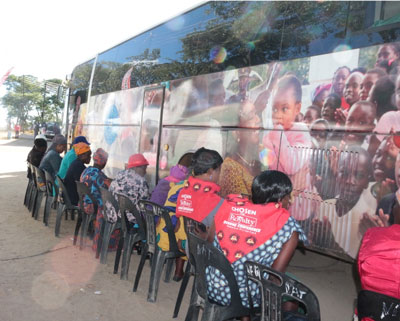
By Tadiwa Nyatanga-Pfupa
The National Aids Council (NAC) and its strategic partners, Angel of Hope Foundation, Ministry of Health and Child Care and UNFPA were at the Apostolic Faith Mission (AFM) Church Ladies’ Conference at Rufaro Mission to screen women for cancer and HIV.
Over 10 000 women attended the conference in Chatsworth, Gutu district.
A total of 684 women were screened for cervical cancer during the conference and three were found to have cervical cancer. Of the 684 who were screened, 33 were known HIV-positive and three of them were confirmed to be having cervical cancer. Commenting on these results, NAC’s Care, Treatment and Support coordinator Caroline Sirewu said the results were confirmation that a number of women look healthy while in actual fact they have cervical cancer.
She encouraged women to get screened for cervical and other cancers.
“For some people it may take a while before symptoms start appearing. By the time they appear, the cancer may be at an advanced stage. Regular checks are the way to go,” Sirewu said.
She said the results confirm the fact that if one is HIV positive, she is at a higher risk of getting cervical cancer and if one has cervical cancer she is at risk of getting HIV, therefore women need to be checked for both HIV and cancer.
Participants at the conference, both male and female, also got an opportunity to be tested for HIV. During the three days of the conference, 295 people were tested for HIV and six tested positive.
- Chamisa under fire over US$120K donation
- Mavhunga puts DeMbare into Chibuku quarterfinals
- Pension funds bet on Cabora Bassa oilfields
- Councils defy govt fire tender directive
Keep Reading
Speaking on the sidelines of the conference, NAC’s acting operations director David Nyamurera applauded those that took up the health services provided. He pleaded with churches to invite NAC and other service providers to their gatherings for provision of services.
“People are ever busy chasing the dollar and have no time to visit health centres for checks and treatment. We therefore catch them at their church gatherings,” Nyamurera said.
“We implore church leaders to give NAC and Ministry of Health and Child Care officials slots to share information on HIV, cancer and other health issues. Once they get to understand these issues, they can then take up the services on offer.”
A participant who tested HIV positive, Grace Tsuro (not her real name), said she took up both the cervical cancer screening and HIV test because the people she had travelled with were doing so.
“I had never been tested for these two before. I never thought it was necessary. I am surprised that I am HIV positive, both my husband and myself are active members of this church, so I am just wondering how I got to have HIV,” Tsuro said.
She added that while it was difficult for her to accept at first, she had been counselled and had accepted her status and was going to encourage her husband to get tested for HIV and know his status.
The Ministry of Health and Child Care has led the first national response to cancer control. NAC has also taken an interest in cancer because of the existence of HIV-related cancers.
In Zimbabwe, about 60% of all new cancer cases are HIV-related and because of this, NAC has been pushed to start to be involved in activities related to cancer management, control and prevention.
The Angel of Hope Foundation, a brainchild of the First Lady Auxillia Mnangagwa is also active in the response to cancer in the country and provided the heavily-equipped bus where cancer screening was being done.











